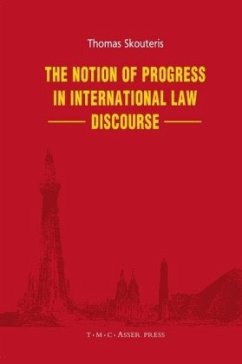Progress is a familiar slogan in international law, commonly used to accompany claims for improvement or change. At the same time, the notion of progress is rarely explored as such in the literature. The book begins to address this gap by examining the function of the notion of progress in international law rhetoric and writing. By looking at three concrete case studies taken from 'everyday' international law, the book concentrates on explaining 'what is it' that makes a specific international law event synonymous with progress. The book engages questions of narrativity, objectivity, and truth in some of international law's founding progress narratives.
Hinweis: Dieser Artikel kann nur an eine deutsche Lieferadresse ausgeliefert werden.
Hinweis: Dieser Artikel kann nur an eine deutsche Lieferadresse ausgeliefert werden.
From the reviews:
"The book must be enthusiastically welcomed for dealing with a difficult and ... unexplored topic. It is well-written and clearly divided into five chapters. ... The Notion of Progress deals with an aspect so essential to the international lawyer's self-understanding that it must be studied deeply, not only to disclose hidden priorities supported by lawyers, but to stimulate the development of at least two research agendas in the international legal discipline ... ." (George Rodrigo Bandeira Galindo, Melbourne Journal of International Law, Vol. 11 (2), 2011)
"The book must be enthusiastically welcomed for dealing with a difficult and ... unexplored topic. It is well-written and clearly divided into five chapters. ... The Notion of Progress deals with an aspect so essential to the international lawyer's self-understanding that it must be studied deeply, not only to disclose hidden priorities supported by lawyers, but to stimulate the development of at least two research agendas in the international legal discipline ... ." (George Rodrigo Bandeira Galindo, Melbourne Journal of International Law, Vol. 11 (2), 2011)








